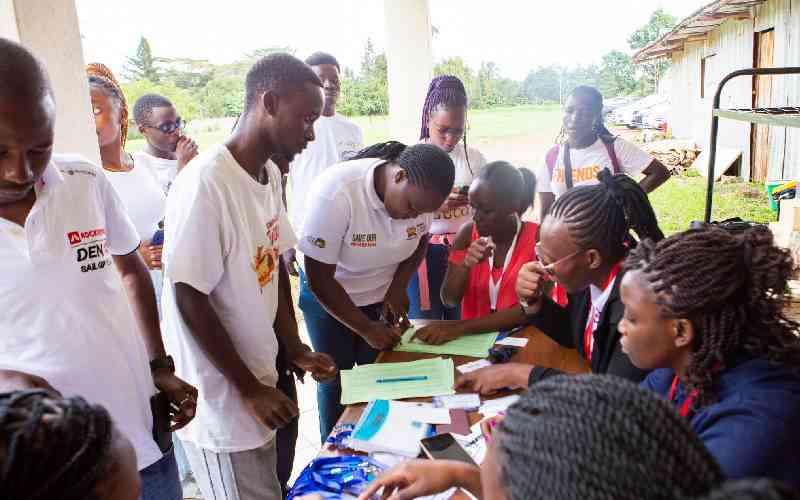Kisumu, Kenya: Waste management remains Kisumu County's most daunting challenge despite the recent growth in infrastructure.
Controlling human waste has become the biggest hurdle given the rising number of street families.
With over 400 destitute families in the city management's data, uncontrolled defaecation has become a health hazard for the town's informal traders within the Central Business District and residents who live close by.
According to locals, areas such as dark streets, abandoned buildings, congested stalls and open sewers are ready toilets for these families.
Traders have in the recent past reported of street families who sleep in their stalls at night, leaving human waste inside or around the premises.
Some have reportedly been dropping faeces in garbage bins installed by the county government.
A county garbage collector who sought anonymity admitted to having met human waste wrapped in polythene bags and placed inside the bins.
"It is a fact that most of these street children leave human waste in the bins and sometimes along pavements. That is why you will sometime feel an offensive smell along some corridors in town. But it is difficult to get them since they do it at night," he said.
UNACCOUNTED WASTE
With the destitute families and another 40 mentally incapacitated roaming the town, 'unaccounted' human waste management has seen hue and cry among traders and residents.
But excretion is no option to any living thing.
To human beings, it is one of the most critical aspects of life which has seen investments such as construction of such waste disposal infrastructure like toilets and latrines.
Street families and the mentally ill are some of the most disadvantaged groups as few people regard them to have the right to use such facilities.
Ojwang' Wuodgimonye, a resident of Ondiek estate, which is closest to town, admits that homeless children spill all over the area.
"Most latrines in the estate remain locked and no one is ready to allow them use them for security reasons. And as human beings they have to excrete and this begs the question; where do they do it?" poses Ojwang.
Stay informed. Subscribe to our newsletter
Kisumu City Manager Doris Ombara admits the city is undergoing tough times in dealing with human waste emanating from the two groups due to lack of provisions which demand that her office avails such services.
Even though there are public toilets all over the town, they are accessed at a fee, thus making street children avoid them.
"It is true that the little money they (street children) get from scavenging and begging goes to food and few of them would spare some for the toilets. However, it is not in our programme to provide free toilets to street families," says Ms Ombara.
NOT TRACED
The city management has in the past sought to eradicate street families by rounding them up and taking them back home, while those whose homes cannot be traced are taken to children's homes and facilities for juveniles.
Some of them, however, find their way back into the streets when the round-up is relaxed, a situation that has seen an influx in the number of homeless families in the town.
According to the city management, over 80 per cent of street families in Kisumu come from neighbouring counties, including Vihiga, Kakamega and Busia.
Ms Ombara who conceded that the city management was 'overwhelmed', called upon stakeholders to establish permanent solutions to the destitute.
She said her office and the county government are working on programmes to build more public toilets for street families to access them free of charge and still reduce the charges for residents.
According to Ombara, the Hindu community, which makes the biggest percentage of traders in the town, has offered to fund few toilets to be managed by the county.
"We have discussed with the Swedish and Austrian embassies to have rescue centres, which we believe are the lasting solution to street families as they are not only a threat to hygiene, but also to security," she said.
 The Standard Group Plc is a
multi-media organization with investments in media platforms spanning newspaper
print operations, television, radio broadcasting, digital and online services. The
Standard Group is recognized as a leading multi-media house in Kenya with a key
influence in matters of national and international interest.
The Standard Group Plc is a
multi-media organization with investments in media platforms spanning newspaper
print operations, television, radio broadcasting, digital and online services. The
Standard Group is recognized as a leading multi-media house in Kenya with a key
influence in matters of national and international interest.
 The Standard Group Plc is a
multi-media organization with investments in media platforms spanning newspaper
print operations, television, radio broadcasting, digital and online services. The
Standard Group is recognized as a leading multi-media house in Kenya with a key
influence in matters of national and international interest.
The Standard Group Plc is a
multi-media organization with investments in media platforms spanning newspaper
print operations, television, radio broadcasting, digital and online services. The
Standard Group is recognized as a leading multi-media house in Kenya with a key
influence in matters of national and international interest.








